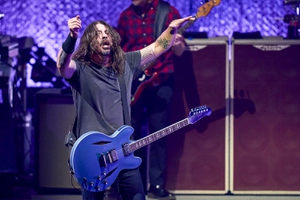The band’s most famous song, “Wagon Wheel,” has become a barroom staple. How often do you hear it or hear someone performing it when you go out? I don’t really go out drinking anymore, but I hear “Wagon Wheel” a lot just from bars and bar windows and street corner bands, so I hear it quite often.
“Sweet Amarillo,” a song on your new album Remedy, is built on a partially finished Bob Dylan song, like “Wagon Wheel” was. How did that come about? It’s a scrap of a Bob Dylan song his manager sent us, because he had heard “Wagon Wheel.” He sent us a little scrap, which I believe was about 30 seconds of an outtake from Pat Garrett & Billy the Kid, the same sessions that “Wagon Wheel” was from. So we’ve got a new Dylan/Old Crow co-write even though we’ve never met him.
Your music is so steeped in the roots of bluegrass and outlaw country, do you ever feel boxed in by what people traditionally expect to hear from that style of music? Not really. I think part of our success is because we haven’t been boxed, because we never really played bluegrass; we always played our own brand of the old-time string band tradition, so we never really had those constraints. I think we realized for ourselves that we can take these musical forms and do what we want with them, which is what people originally did. At one time these roots traditions were brand new, and people were doing new things with them, so we were just kind of expanding that.
Your music obviously has an Americana core to it. How do your songs and performances go over internationally? They go over very well in the British Isles; we’ve played in Canada, Norway, Germany, Belgium, the Netherlands, England, Scotland, Ireland, that kind of area. You can’t have traditional American music without the fiddle tunes of Ireland and the ballads of England. They understand that this is their music as well.
What part of American old-time string music is universal? I think rhythm is universal. When you get down to it, the banjo is an African instrument, and you get the African American influence in the rhythm and the timing and that danceability and the drive of the rhythm and lyrics that talk about universal things like hard times and love and drinking. That’s kind of rock ’n’ roll—the birth of it.
For me it’s always been the storytelling. It’s something anyone can access. I think it’s important to remember that about it. I think people are surprised about American music in realizing that they can play it, too, and their families have been playing it. It’s a folk tradition.
On Remedy, it sounds like you’ve turned up the traditional parts of your style, which is more reminiscent of (2004 debut album) O.C.M.S. Yeah, I guess we did. I don’t know that we even consciously tried to turn up the traditional parts of the rootsy stuff. We got a big sound off Remedy, and that’s a lot to do with [producer] Ted Hutt. Our first album has an intimacy that’s still there with this new album, but I think this new album is really big-sounding. You can really turn it up.
How much do you record live or together? We recorded almost all of this album live in the studio. I think there’s a natural rhythm to what we do, so when we’re all playing together there’s a natural place that we lock into. It’s tougher for me to do if I’m just listening to a playback.
Old Crow Medicine Show September 15, 9 p.m., $33-$39. Brooklyn Bowl, 702-862-2695.






